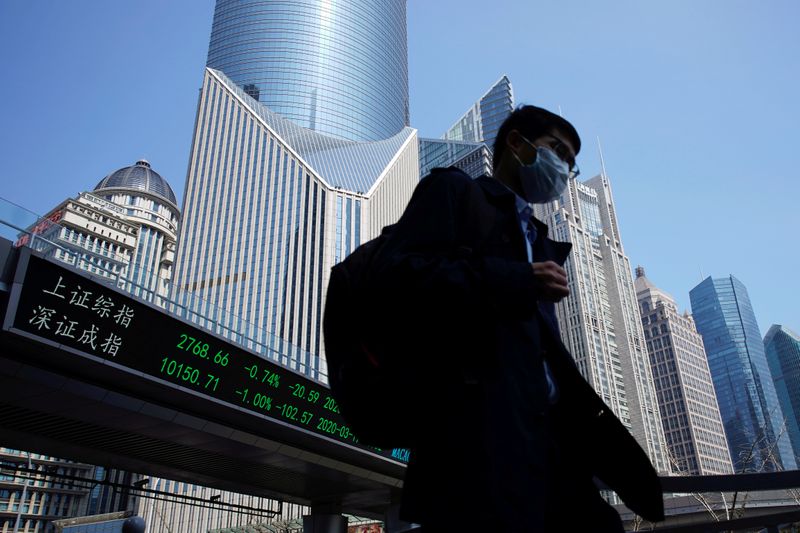
FILE PHOTO: A pedestrian wearing a face mask walks near an overpass with an electronic board showing stock information, following an outbreak of the coronavirus disease (COVID-19), at Lujiazui financial district in Shanghai, China March 17, 2020. REUTERS/Aly Song
April 27, 2020
By Rodrigo Campos
NEW YORK (Reuters) – Stocks rose across the globe on Monday as investors cheered news that more countries and U.S. states were looking to ease lockdowns and the Bank of Japan expanded its stimulus program, while the price of oil continued to crumble as storage runs out.
U.S. energy stocks outperformed the overall market with a 2.1% gain even as U.S. crude prices fell more than 20%.
The U.S. dollar slipped as risk-prone traders cheered lockdown news even as health experts warned that not enough coronavirus testing was in place in the United States. From Italy to New Zealand, governments announced the easing of restrictions, while Britain said it was too early to relax them there. New York state will not reopen for weeks, at the soonest.
The Bank of Japan kicked off a week of central bank meetings by pledging to buy unlimited amounts of government bonds, continuing a trend of historic stimulus announcements to offset the economic effects of the COVID-19 pandemic.
The U.S. Federal Reserve and the European Central Bank meet later in the week, with the ECB expected to increase the size of its bond buying program.
The U.S. state of Georgia began letting residents dine at restaurants and watch movies at theaters as more states, from Minnesota to Mississippi, took steps to ease coronavirus restrictions even though health experts warned it may be too early.
“If we start reopening tomorrow and there’s no big second wave of infections, I still think it’s 6 to 12 months at least until everything is back to normal,” said Oliver Pursche, independent asset adviser in New York.
“It’s much easier to hit ‘stop’ on an economy than it is to press ‘start,’” he said.
The Dow Jones Industrial Average rose 358.51 points, or 1.51%, to 24,133.78, the S&P 500 gained 41.74 points, or 1.47%, to 2,878.48 and the Nasdaq Composite added 95.64 points, or 1.11%, to 8,730.16.
The pan-European STOXX 600 index rose 1.77% and MSCI’s gauge of stocks across the globe gained 1.76%.
Although trillions of dollars in stimulus have helped the S&P 500 recover nearly 30% from its March lows, some analysts say more gains may be capped as the economic damage grows, unless there is progress on treatments for the disease.
“There are so many things that can go wrong in the next six months,” said Marc Chaikin, founder of Chaikin Analytics in Philadelphia, adding that “history suggests that bear markets end with a whimper and not a bang.”
Emerging market stocks rose 1.81%. MSCI’s broadest index of Asia-Pacific shares outside Japan closed 1.88% higher, while Japan’s Nikkei futures rose 1.82%.
(Graphic: MSCI world equity index link: https://fingfx.thomsonreuters.com/gfx/mkt/gjnvwegqavw/world%20stocks.PNG)
OIL DROPS FURTHER
Oil prices weakened sharply on continued concern about oversupply and a lack of storage space. The front-month contract was trading at lower-than-usual volumes as traders moved to later months in futures contracts.
“The market is very concerned about a repeat of negative pricing as the Cushing storage and delivery hub saturates,” Harry Tchilinguirian, global oil strategist at BNP Paribas in London, told the Reuters Global Oil Forum.
“The shift of open interest away from June will have negative consequences for the liquidity of the contract, potentially leading to greater volatility in its price,” he said.
U.S. crude fell 23.55% to $12.95 per barrel and Brent was at $20.07, down 6.39% on the day.
The U.S. dollar dropped as the broader upbeat mood encouraged investors to move into other currencies.
The dollar index fell 0.17%, with the euro up 0.05% to $1.0825.
The Japanese yen strengthened 0.26% versus the greenback at 107.30 per dollar, while sterling was last trading at $1.2421, up 0.44% on the day.
Bucking the trend, the Brazilian real was on track to close at a record low against the greenback.
U.S. Treasury yields rose, with the benchmark 10-year note last down 20/32 in price to yield 0.6589%, from 0.596% late on Friday.
The 2-year note last dipped less than 1/32 in price to yield 0.2223%, from 0.216%.
Spot gold dropped 0.8% to $1,713.40 an ounce.
The United States and European Union both release first-quarter economic growth numbers this week, while the influential U.S. ISM manufacturing survey is also due.
(Reporting by Rodrigo Campos; additional reporting by Karen Pierog in Chicago and Stephanie Kelly, Karen Brettell and Stephen Culp in New York; Editing by Dan Grebler and Jonathan Oatis)

